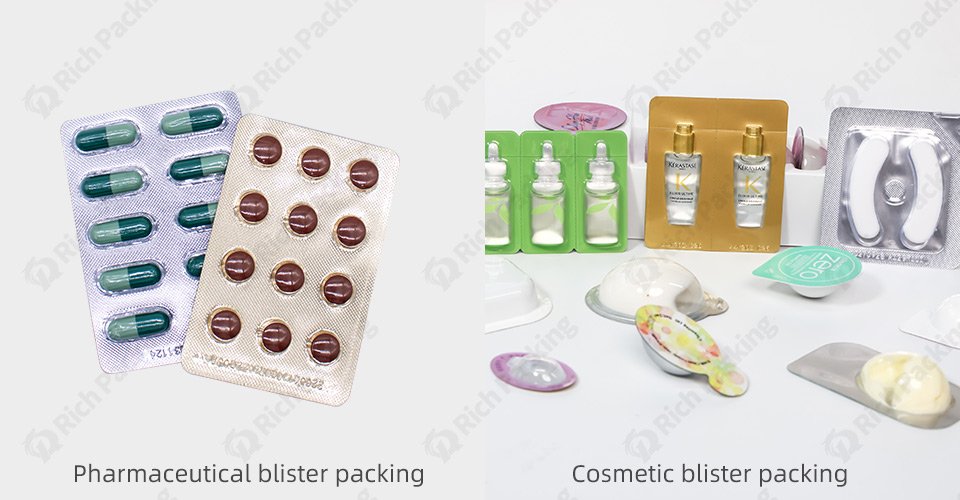Pembungkusan lepuh ialah penyelesaian serba boleh dalam industri farmaseutikal, menawarkan gabungan perlindungan produk, ketepatan dos dan daya tarikan visual. Walau bagaimanapun, tidak semua produk adalah sama, dan menyesuaikan pembungkusan lepuh untuk memenuhi keperluan khusus adalah penting untuk kefungsian dan persembahan yang optimum.
Panduan ini menerangkan cara anda boleh menyesuaikan pembungkusan lepuh untuk memenuhi pelbagai keperluan produk farmaseutikal, daripada tablet dan kapsul kepada barangan khusus. Anda akan menemui strategi, alatan dan cerapan untuk memastikan pembungkusan lepuh anda sejajar dengan permintaan unik produk anda.

Pembungkusan lepuh melibatkan pengedapan produk individu dalam rongga yang telah dibentuk, biasanya diperbuat daripada plastik atau aluminium, dengan bahan sokongan seperti kerajang atau papan kertas. Ia digunakan secara meluas dalam farmaseutikal untuk bentuk dos pepejal, peranti perubatan dan nutraseutikal.
· Perlindungan : Melindungi produk daripada kelembapan, cahaya dan pencemaran.
· Ketepatan : Memastikan dos dan pembahagian yang tepat.
· Kemudahan Penggunaan : Meningkatkan kemudahan pengguna dengan reka bentuk yang mudah dibuka.
Penyesuaian memainkan peranan penting dalam memastikan pembungkusan lepuh memenuhi keperluan produk dan pasaran tertentu.
Produk yang berbeza mempunyai sifat unik, seperti kepekaan terhadap kelembapan atau cahaya. Penyesuaian memastikan pembungkusan menawarkan tahap perlindungan yang betul.
Pembungkusan farmaseutikal mesti memenuhi piawaian kawal selia yang ketat. Penyesuaian membantu anda mematuhi garis panduan ini sambil mengekalkan kecekapan.
Pek lepuh yang disesuaikan meningkatkan persembahan produk, menjadikan jenama anda lebih dikenali dan menarik perhatian pengguna.
Reka bentuk pembungkusan lepuh tersuai mengurangkan keperluan ruang penyimpanan dan memastikan pengendalian mudah semasa pengangkutan.
Langkah pertama ialah menganalisis keperluan khusus produk anda.
· Sensitiviti Produk : Menilai faktor seperti kelembapan, cahaya atau sensitiviti suhu.
· Saiz dan Bentuk : Pertimbangkan dimensi dan geometri produk.
· Kuantiti setiap Pek : Tentukan sama ada pembungkusan tunggal atau berbilang dos diperlukan.
Pilihan bahan mempengaruhi keberkesanan pembungkusan lepuh anda dengan ketara. Pertimbangkan komponen penting ini:
· PVC (Polyvinyl Chloride): Pilihan standard yang menawarkan sifat penghalang yang baik
· PVDC (Polyvinylidene Chloride): Penghalang lembapan yang dipertingkatkan
· COC (Cyclic Olefin Copolymer): Perlindungan kelembapan yang unggul
· PET (Polyethylene Terephthalate): Kejelasan dan kebolehkitar semula yang sangat baik
· Kerajang aluminium: Sifat penghalang premium
· Kerajang bersandarkan kertas: Kekuatan dipertingkatkan
· Bahan tahan kanak-kanak: Gabungan polimer khas
Reka bentuk rongga hendaklah sejajar dengan saiz, bentuk dan kegunaan produk.
· Unit Tunggal : Sesuai untuk ubat preskripsi atau ujian klinikal.
· Reka Letak Berbilang Unit : Sesuai untuk produk over-the-counter (OTC) atau pembungkusan pukal.
· Bentuk Rongga Tersuai : Untuk produk unik seperti tablet effervescent atau kunyah.
Teknik pengedap harus memastikan rintangan gangguan sambil mesra pengguna. Pilihan termasuk:
· Pengedap Haba : Untuk bon selamat.
· Pengedap Sejuk : Untuk produk sensitif yang memerlukan pendedahan haba minimum.
|
Parameter |
Julat Biasa |
Faktor Kritikal |
|
Suhu |
120-200°C |
Sifat bahan |
|
Tekanan |
2-6 bar |
Kawasan permukaan |
|
Masa |
1-3 saat |
Ketebalan bahan |
Pembungkusan lepuh tersuai boleh termasuk warna berjenama, logo dan arahan untuk meningkatkan daya tarikan produk.
Menjalankan ujian yang ketat untuk memastikan pembungkusan memenuhi piawaian farmaseutikal. Ujian biasa termasuk:
· Kebolehtelapan Kelembapan : Memastikan produk kekal kering.
· Integriti Meterai : Mengesahkan kedap udara pek lepuh.
· Ujian Gugur : Menilai ketahanan semasa pengangkutan.
Pek lepuh tersuai memastikan dos yang tepat dan melindungi integriti produk.
Peranti kecil seperti picagari dan alat diagnostik mendapat manfaat daripada reka bentuk rongga dan bahan pelindung yang disesuaikan.
Pembungkusan lepuh berjenama untuk vitamin dan suplemen meningkatkan daya tarikan pengguna dan keterlihatan rak.
Tablet effervescent atau boleh kunyah memerlukan bentuk rongga yang unik dan bahan tahan lembapan.
Bahan dan reka bentuk yang disesuaikan memastikan perlindungan optimum terhadap faktor persekitaran.
Reka bentuk yang mesra pengguna, seperti pek lepuh yang boleh dikupas atau tolak, meningkatkan kepuasan pelanggan.
Percetakan tersuai dan susun atur unik menjadikan produk anda menonjol di rak.
Reka bentuk yang dioptimumkan mengurangkan sisa bahan dan meningkatkan kecekapan pengeluaran.
Bekerjasama dengan pengeluar pembungkusan lepuh yang berpengalaman untuk memastikan kualiti dan kecekapan.
Mesin pembungkusan lepuh moden menawarkan ciri penyesuaian lanjutan, seperti pemanasan berbilang zon dan pemeriksaan automatik.
Fahami keutamaan pengguna dan keperluan peraturan untuk menyesuaikan pembungkusan anda dengan berkesan.
Mesin pembungkusan lepuh yang boleh dipercayai memperkemas penyesuaian dan memastikan output yang konsisten.
Untuk perniagaan yang mencari keupayaan penyesuaian lanjutan, Mesin Pembungkus Lepuh DPP-180Pro oleh Jinlu Packing adalah pengubah permainan.
· Keserasian Bahan Serbaguna : Mengendalikan PVC, aluminium dan banyak lagi.
· Reka Bentuk Rongga Ketepatan : Reka letak boleh disesuaikan untuk pelbagai bentuk dan saiz produk.
· Pengeluaran Berkelajuan Tinggi : Mampu menghasilkan sehingga 300 lepuh seminit.
· Antara Muka Mesra Pengguna : Memudahkan penyesuaian dan mengurangkan ralat operator.
|
Ciri |
Faedah |
|
Pilihan Bahan Serbaguna |
Menampung keperluan produk yang pelbagai |
|
Pengeluaran Berkelajuan Tinggi |
Sesuai untuk pembuatan berskala besar |
|
Reka Letak Boleh Disesuaikan |
Memenuhi keperluan produk tertentu |
Menyesuaikan pembungkusan lepuh adalah penting untuk memenuhi pelbagai keperluan produk farmaseutikal. Daripada pemilihan bahan kepada reka bentuk rongga, setiap langkah dalam proses penyesuaian meningkatkan perlindungan produk, pematuhan dan daya tarikan pengguna.
Bersedia untuk meningkatkan penyelesaian pembungkusan lepuh anda? Hubungi kami hari ini untuk mendapatkan nasihat yang disesuaikan dan cadangan peralatan canggih!